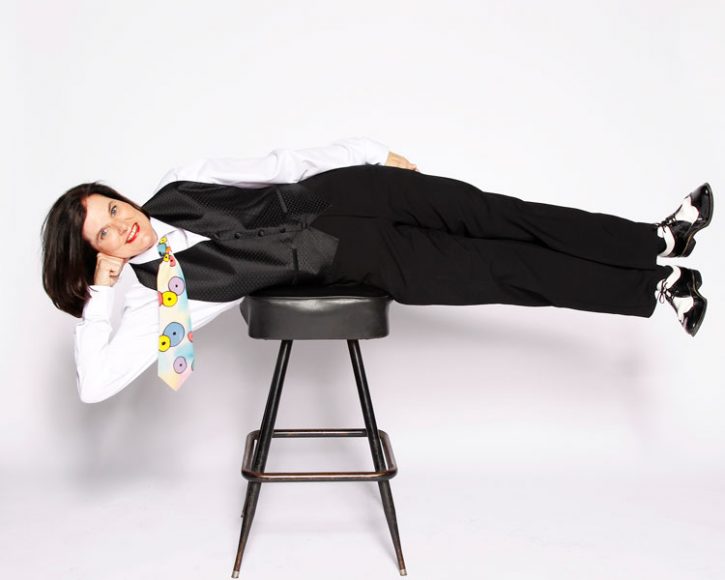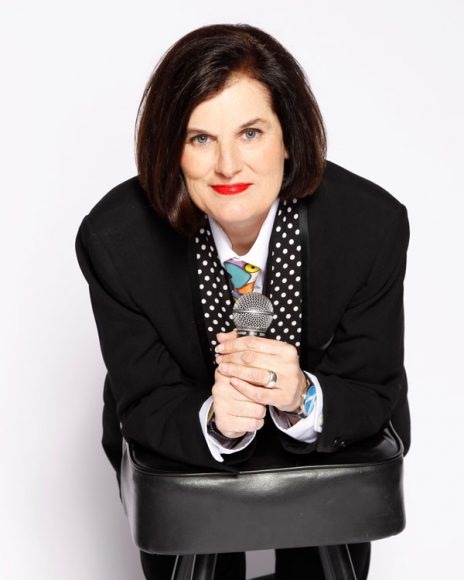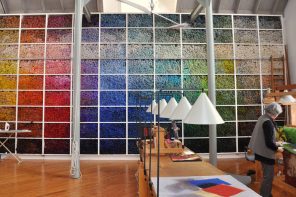Comedian Paula Poundstone has been making us laugh for almost 40 years. Her distinctive deadpan delivery style of stand-up, as well as her colorful suits and ties, have made her a favorite in comedy clubs and theaters and on TV talk shows.
The author of two books, her comedic persona has also earned her a place as a popular panelist on NPR’s “Wait Wait…Don’t Tell Me!” In 2017, she debuted her own NPR podcast, “Live From the Poundstone Institute,” which is alternately
hilarious and informative. She talked with us before her Oct. 6 gig at the Ridgefield Playhouse:
Paula, your second book, “The Totally Unscientific Study Of The Search For Human Happiness,” was published in 2017. Would you say that writing books could be considered a natural progression or extension for someone who writes comedy or is it a different animal?
“I think, to some degree, it is a different animal. For one thing, it just plain requires more discipline, which is why I’ve written two books in my entire life. I don’t have that kind of discipline. In fairness, I’m not a writer for a living. If my research on Dickens is correct, I believe he wrote for two weeks, then didn’t, then did again for two weeks. He went for these great long walks where I’m sure he did most of his writing…. I’m sure those two weeks of writing were secretarial work, that he had notes, at least in his head. I’m sure he crafted those stories while he walked. I don’t have that kind of time to set aside.”
Do you have favorite fellow comedians, who are also writers, that you also possibly looked to for your own process for the book?
“No. There are other comics who are writers. I don’t go see other comics and I don’t read (books by) other comics. The thing is, when you go onstage, you want to know that everything you’re saying comes from you. I’m a parrot. If I hear something one place, I have a tendency to somehow (repeat it) and then I can’t remember where I got it, and then I’m like, ‘Well, I thought it was mine.’ It’s best that I dam up that stream. Mostly, as a reader I read nonfiction, not comedy. I’m looking at my stack of books waiting for me here. One is ‘What Happened’ by Hillary Clinton. ‘The Shallows’ by Nicholas Carr about the effects of (computer) screens on the brain. I read a lot about us and screens because it’s affected my family badly. Another is Phil Klay’s ‘Redeployment,’ although they are short stories, they’re fiction based on fact, about service guys.”
In an NPR interview that you did around the time the book was published, you said that there’s a “difference between enjoying something and something making you happy.” Do you think that that’s the book’s ultimate message?
“Yes, if you just take the example of the Lamborghini and working out. Never in my life have I said to myself, when I’ve seen someone exercising, ‘Boy, I’d like to do that.’ But sometimes you see someone in a fancy sports car and you go, ‘Wow. I wonder what that’s like.’ There’s barely a moment of working out that I could say I ever enjoyed. The guy that I did the get-fit experiment with — it was so f—ing grueling that I can barely describe it. It was like being beaten with sticks. It was one of the most successful experiments in the book in terms of providing happiness.
“The Lamborghini, I think it’s safe to say, was a giant fail in the area of happiness. Not that it wasn’t enjoyable. But I don’t think there’s any great biochemical process taking place. It’s never going to say it in a Hallmark card, but happiness is a biochemical process. I think, from the start, that was the question I was addressing in the book: ‘What could I do that would give me a bounce so that when I returned to my regular life of raising a houseful of kids and animals and struggling with my work, that I’d still feel on an even keel, at least, as I did those things?’”
You could also have the memory of the experience to refer to.
“Yes, but to still have that lift. One of the things about working out is that the effects are ongoing. There’s no question that you don’t feel good while you’re doing it. One could argue that you feel good afterwards, because you’re not doing it anymore, but you still feel good afterwards.”
The book is a “Totally Unscientific” study. Science also comes into play in your podcast “Live From the Poundstone Institute.” As school subjects go, where did science rank in your education?
“Aw, I sucked. In fact, for my seventh-grade science teacher Mrs. Boatman, we had to pick an element and do a report on it. I picked tin. All the things we thought of as tin, weren’t. Tin cans, tin pie plate — they were all aluminum by that point. I had all of these visual aids. I had a pie plate and I’d say, ‘Well, this isn’t tin, it’s aluminum.’ I’d come to something else and I’d say, ‘Well, this isn’t actually tin either, it’s aluminum.’ It was making my class my laugh. We enjoyed the presentation.
“Afterwards, when Mrs. Boatman announced the grades, which she delighted in doing, she said, ‘Well, if I was giving you a grade for entertainment, it would be an A. But for science…’ I can’t remember if it was a B or C, but my entertainment grade was much higher. Maybe she steered me in the right direction. Maybe I’d be an astronaut now if it wasn’t for Mrs. Boatman leaning heavily on the comedy.”
Speaking of NPR, before becoming a panelist on “Wait Wait…Don’t Tell Me!” and then having your “Live From the Poundstone Institute” podcast, how much did NPR figure into your daily life?
“For many years, I was a listener to ‘Morning Edition.’ In the car and at home, I didn’t listen to any stations other than public radio. In fact, I used to wear a KCRW jacket because I made a fine donation. I definitely started most mornings off with (‘Morning Edition’) because I trust their news, although that becomes an issue more and more in current days than it was years ago — the whole idea that some people were telling you sh– that wasn’t true. But that comes more from our president and Fox.”
I’m glad you mentioned the president, because I was wondering if he has had an effect on your comedy one way or another?
“I talk about him here or there. There are nights when I don’t necessarily. I think it’s had an impact on the audience for sure. People come up to me over and over again and say, ‘Oh, it was so good to go out and laugh.’ He has singlehandedly depressed an entire nation, if not the world. He’s really bummed people out. This idea that the leader lies to you and that we’re being told on a daily basis that we’re closer to nuclear war than we’ve ever been.
“The idea that we ended up with this guy, I think it’s depressed the hell out of everyone. I’ll tell you what industry it’s been great for is therapists. I have friends who are therapists and they tell me that their offices are filled with people who want to talk about Trump.”
As a parent, do you see it having an effect on your kids?
“They’re all young adults now, but I haven’t seen them gravitating towards watching politics or the news carefully. They will, but they’re not really there yet. I think it puts people off from taking an interest, if it wasn’t already in their veins to begin with. Some young people are fascinated with it from the start. I think that’s the helplessness that you feel — it’s easier not to watch than to watch.
“I was telling my daughter last night that I got involved watching the news during the Iran-Contra scandal. The televised hearings were so interesting that I started watching and following who all the players were. I had a deck of Iran-Contra trading cards. It had cartoon images of the characters on one side and an explanation of who they were on the other. I relied on those as I watched the hearings.”
You have a full schedule of tour dates. What are the best and worst parts of being on the road for months at a time?
“Luckily, I’m not a band, so I don’t go out in a van and just stay out. I would not do well with that. But I go out for a few nights and then I come home. Hopefully, it’s weekly. I like to work as much as I can, but I wouldn’t enjoy being out for a month at a time. The audience, the audience, the audience. I live a strange, unbalanced life of being basically by myself in a hotel room for a lot of time, and then I go be with a crowd and then I go back to being ridiculously alone. But I love the audience. I’m out with crowds of people laughing about the things that are difficult. I feel bad for people who don’t have that. They’re going through the same difficult things I’m going through. They just don’t get to laugh about it a few nights a week. It is really healing. It’s the thing that keeps me sane and, dare I say, somewhat happy.”
Paula Poundstone plays the Ridgefield Playhouse Oct. 6. For more, visit ridgefieldplayhouse.org.





